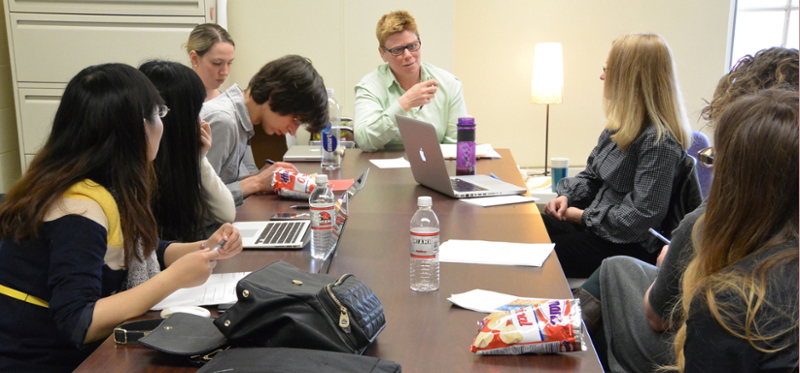
Graduate Admission
Candidate Qualifications
Master's Programs
We enroll approximately 12–15 new students in the master's programs in composition/rhetoric, creative writing, and literature each year. Admitted students hold bachelor’s degrees from a range of undergraduate institutions within the region (e.g., Ohio State University, University of Cincinnati, Northern Kentucky University) and beyond it (e.g., Boston University, Seattle University, Wisconsin) and both large (e.g., University of Michigan, University of Pittsburgh) and small (e.g., Lipscomb College, Mt. Holyoke).
Particular degree concentrations seek particular qualities in their master’s candidates. For the Creative Writing concentrations in fiction or poetry, the quality of the materials an applicant submits, demonstrating aptitude for and further potential in creative work, is the crucial determining factor for admission.
For the concentration in Composition and Rhetoric, faculty look to the critical writing sample, seek previous experience in the teaching of writing or a related endeavor, and evaluate potential for excellence in research as vital qualities in successful applications.
And for the M.A. in Literature, a solid background in literary history and some exposure to contemporary literary theory, a well-written and well-researched analytical essay, and a statement of intent that shows a clear understanding of the nature of graduate training in literature weigh equally with the faculty members who evaluate applications.
Doctoral Programs
In keeping our total graduate population relatively small, we must accept only a small number of highly qualified students whose interests and abilities match our program, with about 6-8 new doctoral students enrolling each year.
New students join us from such diverse institutions as California Polytechnic State University, University of Colorado at Boulder, North Carolina Central University, University of Louisville, University of Akron—and Miami University. Nearly all successful applicants have already earned the M.A. degree in literature, composition and rhetoric, or another cognate field, and demonstrate their skills as readers and writers through the application materials they submit.
Successful doctoral applications in either concentration have many qualities in common. Faculty from each program look for evidence of excellence in a candidate’s undergraduate and graduate record. They evaluate the writing samples applicants submit in accord with the norms of current research standards within their disciplines. Those applicants with previous teaching experience or demonstrated interest in the theory and practice of teaching composition and/or literature are highly prized, and candidates for admission should include some discussion of teaching in their personal statements. Finally, an applicant who can demonstrate a clear set of related research interests throughout the different elements of her/his application will have a real advantage in the admissions process.
Students who have met the requirements for the Master of Arts in English, in either a thesis or non-thesis plan, may apply for admission into the doctoral program. Anyone whose master’s degree is in another field is also welcome to apply. Only those applicants who can be funded with a graduate teaching appointment will be eligible for admission.
The departmental Admissions and Awards Committee takes into consideration courses, grades, foreign language preparation, the applicant’s personal statement, the three letters of recommendation, and a writing sample. Students with an M.A. will be considered for admission to graduate study at the doctoral level.
Frequently Asked Questions
for Graduate Program Applicants
- You have earned a graduate degree (masters or higher) from Miami University.
- You are a Ronald E. McNair Scholar or alum.
- You are from a low income country designated by the World Bank.
- The length of the personal statement is typically 2-3 pages.
- The writing sample is typically between 15 and 20 pages. If the sample is longer, it will still be accepted but please keep in mind that the admissions review committee values quality over quantity.
- Unofficial transcripts are sufficient for the initial application process, but once you are accepted, official transcripts will be required.
